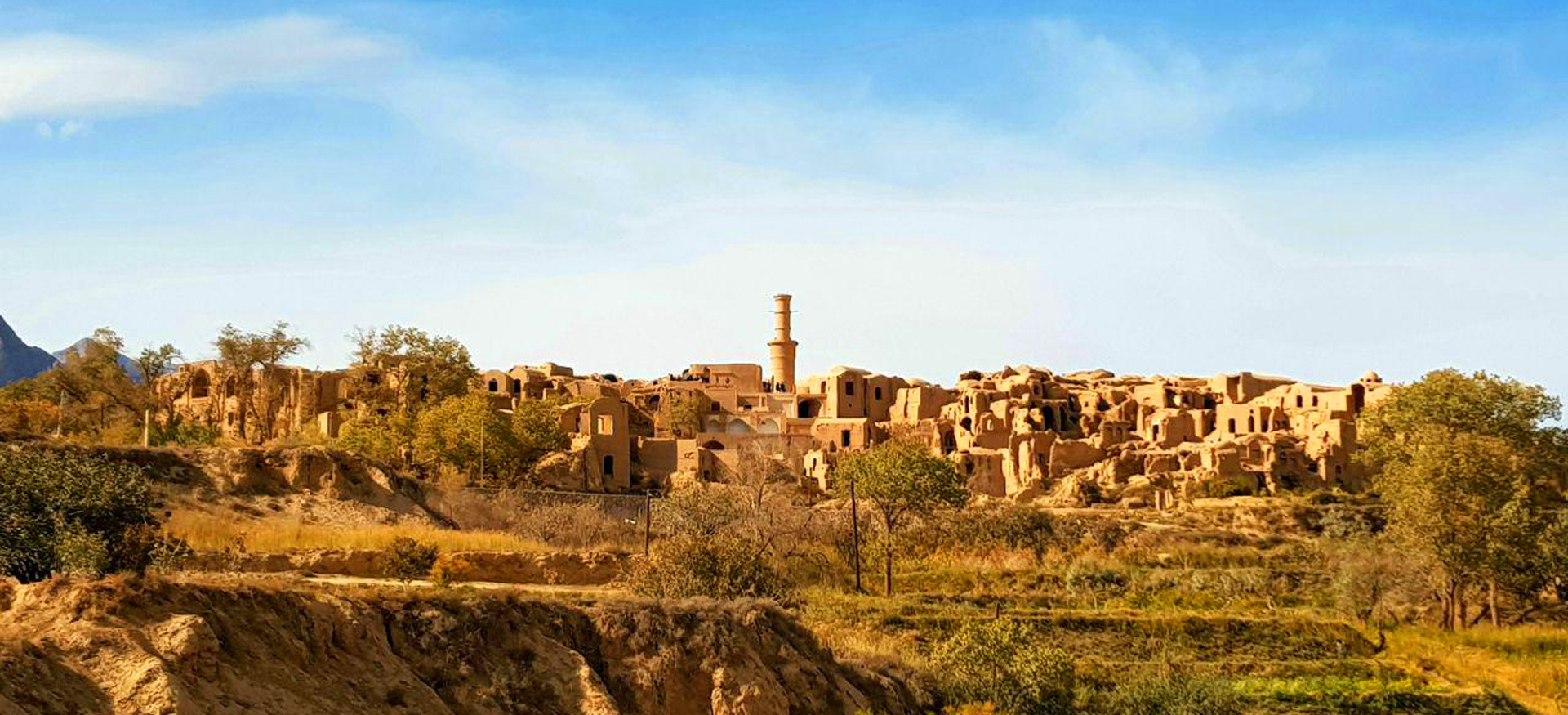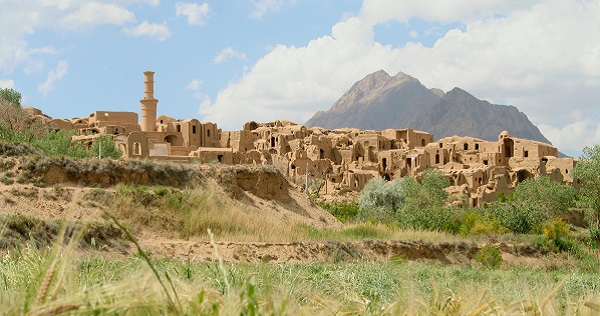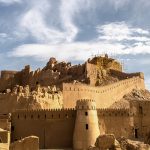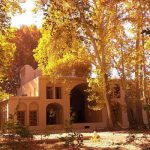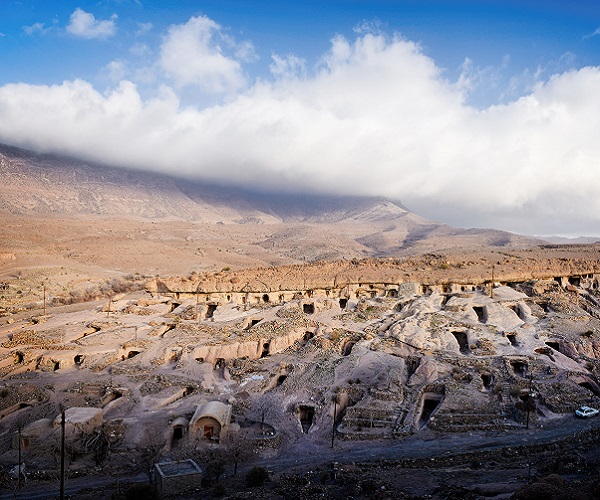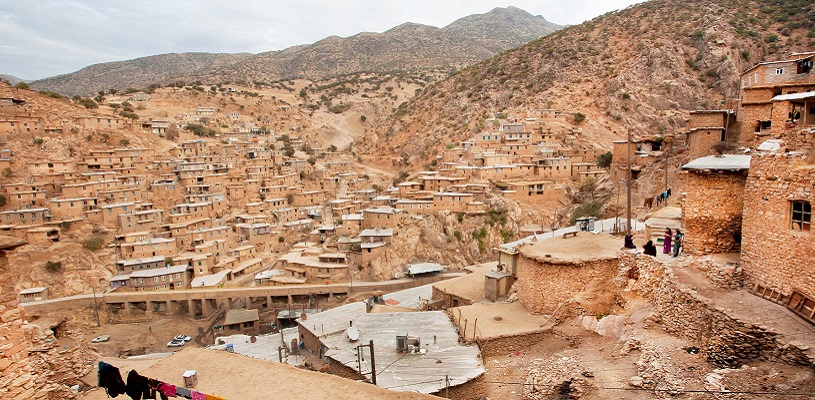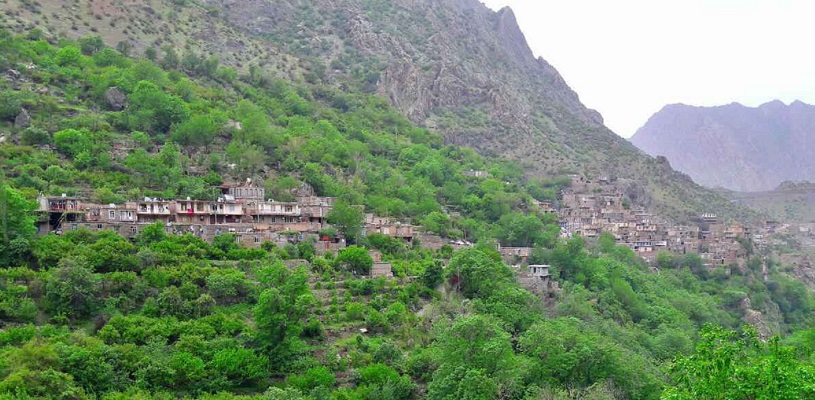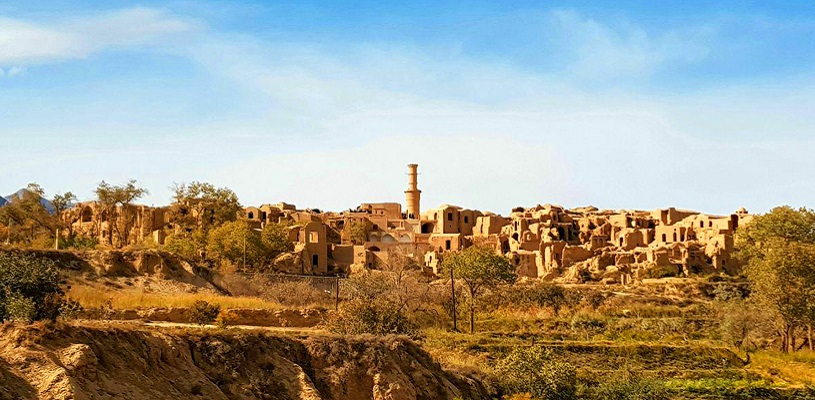
Kharanaq Village (Kharanagh Ardakan Castle) | Yazd, Iran
Interested in the desert and the life there? The sunny Kharanaq Village will warm up your heart. Indeed, the adobe village of Kharanaq will make you nostalgic and filled with longing for the past. Kharanaq Village is one of central Iran’s most amazing ancient villages, sitting in a remote valley about 90 Km north of Yazd. As far back as 4500 years ago, Kharanaq Village came to existence. It has been so popular that it enjoys international fame. The village comprises two areas: the new town and the old town (also known as Kharanaq Castle). The new town is still inhabited, though, the old town was deserted thirty years ago due to erosion. This abandoned city is one of the largest adobe structures in Iran that will amaze the visitors. Let’s explore it together.
Contents
- 1 Why Visit Kharanaq Village?
- 2 Where Does the Name Kharanaq Come From?
- 3 Popular Attractions in Kharanaq Village
- 4 The 1800-Year-Old Kharanaq Castle
- 5 Kharanagh Shaking Monar Jonban
- 6 Kharanaq Hamam
- 7 Kharanaq Mosques
- 8 Kharanaq Bridge
- 9 Khranagh Mirrors
- 10 Karanaq Caravanserai
- 11 More about Kharanaq Village
- 12 Like to pay a visit to Kharanaq Village?
- 13 Kharanagh Castle Tour
- 14 Kharanagh on Map
Why Visit Kharanaq Village?
- Kharanaq Village is a splendid site that attracts many tourists from all over the world.
- It embraces one of the largest adobe residences in Iran, called Kharanaq Castle.
- The castle is among the castles in the world that feature two-or-multi-story houses.
- Dating back to 4500 years ago, Kharanaq Village is a tourist attraction of historical value.
- The ancient Kharanaq Caravanserai will present you with delight of experiencing a unique stay in an ancient inn.
- The spectacular Kharanaq Monar jonban (shaking minaret), the only Iranian adobe Monar Jonban attracts many tourists.
Where Does the Name Kharanaq Come From?
In the old days, locals called Kharanaq Village Khuranaq or Khurnaq. Even today, locals call the village Khuranaq. If you ask them about the meaning of the name of the village, they will explain to you that it means “Cradle of the Sun”. Truly, the name suits the village where you can feel the sun in every corner!
Popular Attractions in Kharanaq Village
Let’s get to the heart of the village, particularly, the adobe buildings in the old town. Kharanaq Castle, Kharanaq Monar Jonban, Kharanaq Hamam, Kharanaq mosques, Kharanaq Bridge, and Kharanaq Mirrors are the major tourist attractions of the village that you must definitely visit once there.
The 1800-Year-Old Kharanaq Castle
The most significant attraction in Kharanaq Village is Kharanaq historical castle. Kharanaq Castle is one of the largest residential castles in Iran. This thrilling relic of the past is one hectare and includes 80 one-to-four-story houses. Surprisingly, most of these houses, unlike typical houses in the desert, feature no yards. The architectural highlights of the castle include the high-density housing, narrow covered passages, local materials as well as temperature regulating materials. Narrow, winding allies of the castle narrate stories of the local’s genius. In fact, the locals built those allies to trap and arrest thieves and bandits.
They founded Kharanaq Castle on top of a hill, which offered a commanding view of the region. To keep the castle safe, the dwellers constructed a defensive wall and a moat (a protective hole) around the castle. Moreover, several fortifications including six watch towers, and four gates reinforced the security of the castle. Although the fortifications of the castle date from Sassanid dynasty, about 1800 years ago, some evidence is suggestive of life in the castle from 4500 years ago. Locals used to live here until the new town was founded thirty years ago.
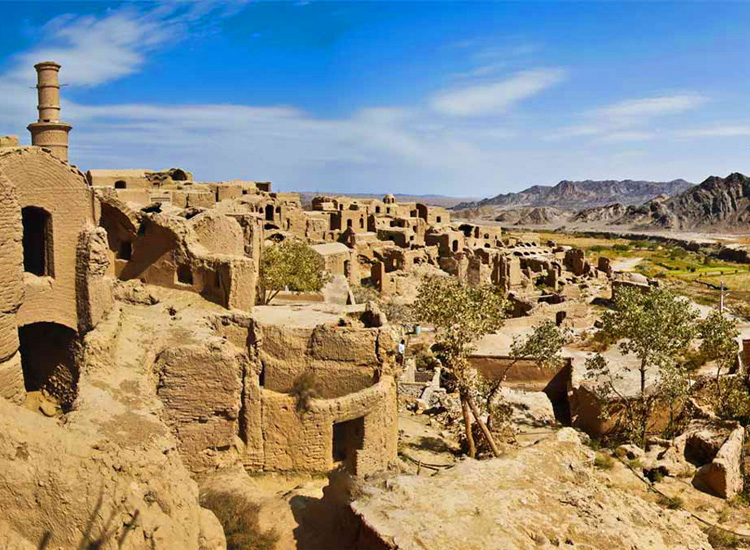
Kharanaq Castle
Kharanagh Shaking Monar Jonban
The unique mud tower dates from Sassanid period (224-651 AD). Later, Seljuks (1043-1194 AD) completed the construction of the tower. Although, Kharanaq Monar Jonban reminds the visitors of the Monar Jonban in Isfahan, it is older compared to the shaking minarets in Isfahan. Kharanaq Monar Jonban is among three shaking minarets in Iran, which have remained intact. This fifteen-meter-high structure erected over the roof of the mosque, is among the tallest constructions in Kharanaq Castle. The minaret is three stories tall with two spiral staircases and used to function as a watch tower and a mil (signpost) for travelers.
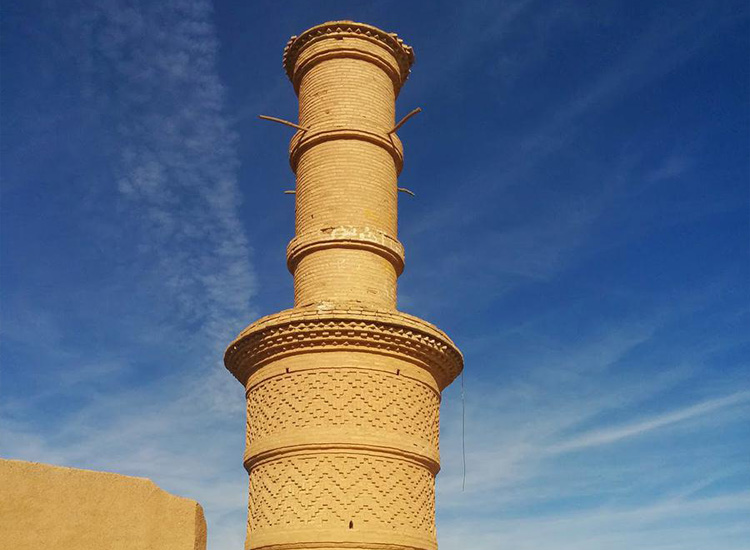
Kharanagh – Kharanaq Monar Jonban
Kharanaq Hamam
The traditional Kharanaq bath is a mementos of Qajar dynasty constructed in Kharanaq Caravanserai. In order for the locals to access the qanat water, they built the hamam below the level of the castle and above the level of the village. By employing this genius architectural method, waste water was discharged to the outside of the castle. Additionally, through thick mud brick walls, they protected the bath from losing heat. The structure features a dome-shaped roof, in which small holes provided lighting for the hamam.
Kharanaq Mosques
Among mosques in the castle is the Jameh Mosque (Friday Mosque) of Kharanaq. Jameh Mosque, built between 14th and 16th centuries, subtly exhibits Persian architecture. In particular, the mosque features a square Shabestan (prayer hall) surrounded with chambers. It is mainly made of earth and amazing mudbricks adorn the exterior of the mosque.
Kharanaq Bridge
Ten centuries ago, the oldest bridge in Yazd, Kharanaq Bridge was constructed. Indeed, its main function was to transport water from a qanat, set up on the other side of the river, to the farms and gardens of the village. Today, Dookali River is not flowing anymore and this bridge with its Sassanid-Roman architectural style, functions as a stunning tourist attraction of the village.
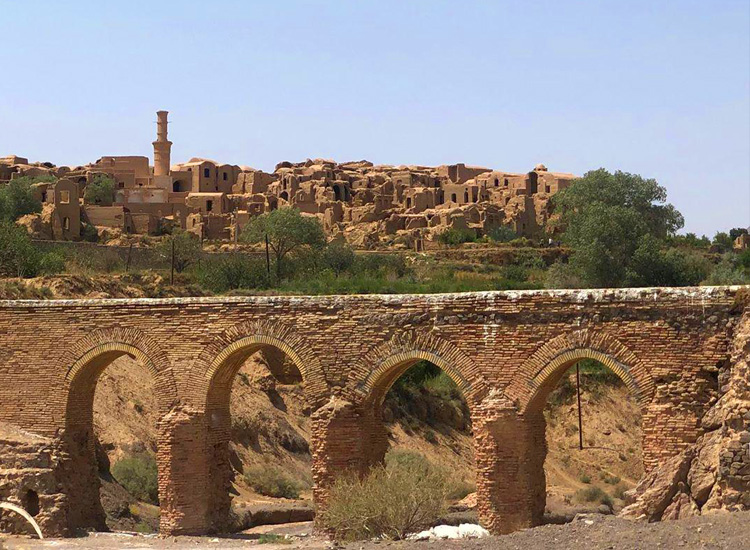
Kharanagh – Kharanaq Bridge
Khranagh Mirrors
The Dookali dry river bed exhibits a new attraction called Khranaq Mirrors. In fact, nine mirrors are installed such that they reflect the landmarks of the village very glamorously.
Karanaq Caravanserai
The Sassanids (224-651 AD) founded Karanaq Caravanserai. Later, in the 18th century, a Qajar ruler restored it. Thus, the locals call this place the Prince Caravanserai since then. At the present time, Kharanaq Caravanserai hosts numerous tourists from across the globe.
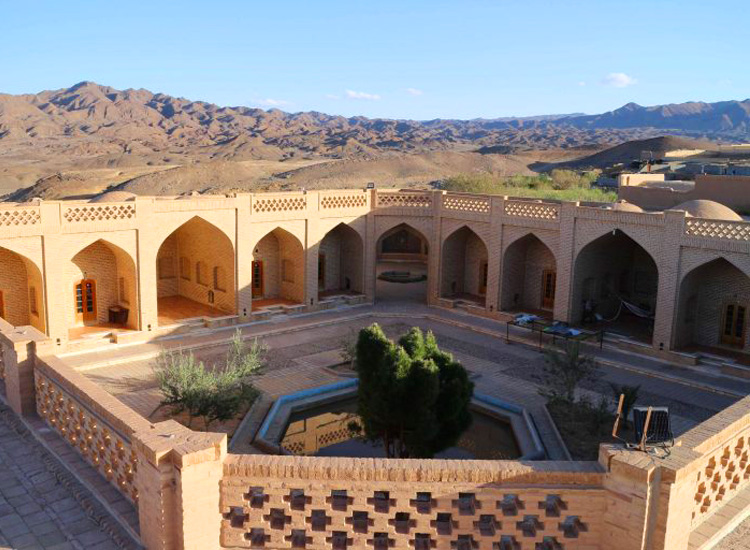
Kharanagh Caravanserai
More about Kharanaq Village
When to visit Kharanagh
The best time to travel to Kharanaq Village is between late March and late September.
Visit Hours
24 hours per day, seven days a week.
Kharanagh Nearby Attractions
Not far away from Kharanaq village, stands a chief Zoroastrian Temple called Chak Chak or Pir Sabz. The temple is located in a breathtaking oasis in the heart of the desert. The green trees and a spring surrounding the temple bring about an eye-catching landscape.
Nearby Restaurants
Talebi Restaurant
Like to pay a visit to Kharanaq Village?
Then join our Kharanaq, Chak Chak and Meybod excursion tour.

